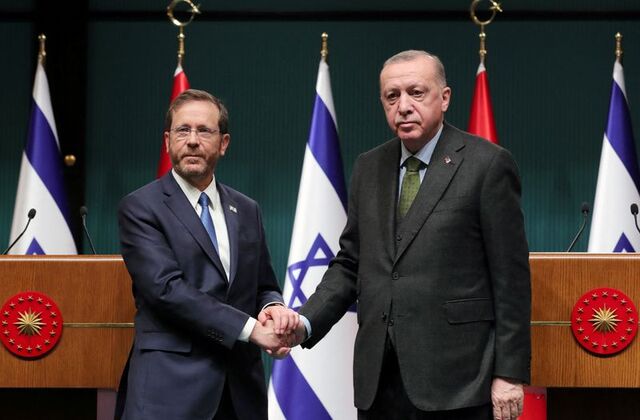This may put the Zionist regime in a difficult position due to its commitment to Cyprus and Greece in the field of energy cooperation and tensions in the relations of the two countries with Turkey. Turkey condemns “unilateral” gas exploration of Cyprus.
Ankara also believes that the Turkish Cypriot rights to potential underground reserves have been ignored and that most of the monopoly economic zone within Cyprus belongs to them. The next issue raised at the meeting was the transfer of Israeli gas to Europe via Turkey in the midst of the Russia-Ukraine war; but the issue of transfer of Zionist regime gas to Europe was seriously raised in 2016.
In 2016, the then Israeli Energy Minister Yuval Steinitz announced Turkey’s plan to import Israeli natural gas from the Leviathan gas field, which was supposed to reach Turkey in 2020 with the necessary funding, but tensions between the two sides continued. The changing regional energy cooperation prevented the project from being implemented.
Energy cooperation between Ankara and Tel Aviv has been facing serious obstacles since 2016, which was strengthened by Russia’s dominance over the energy market and developments in the Nord Stream 2 project. Despite this, the EU is pursuing its interests in the Eastern Mediterranean and some major regional projects such as the East Med pipeline, which connects the region’s energy resources to Greece via the island of Cyprus, and the Melita gas pipeline between Malta and Italy.
Those projects could benefit from EU funding by the end of 2027 because they are referred to as the “Common Interests Projects” (PCI).
To continue the project, demand in Southeast Europe must increase and supply in the region must fall or gas prices must be high to create an opening in the project.
If the current gas outlets of the Eastern Mediterranean are not very suitable, the East Med pipeline can be considered. In the meantime, a key player must be activated to be able to link the interests of buyers and sellers and find a business solution to generate revenue for producers by creating competition and offering alternatives to buyers.
Some experts opposed to Turkey’s policies in the Mediterranean have cited “construction of the Eastern Mediterranean Pipeline” as an important factor in reducing Turkey’s presence and influence in the geopolitical equations of the Eastern Mediterranean.
All buyers and sellers should be brought together by a market leading company. One of the main drivers will be the level of risk that suppliers are willing to accept. Most gas sales contracts have so far given producers a definitive price guarantee, which is not easy to do in Europe.
The East Med Pipeline, with a capacity of carrying 9 to 12 billion cubic meters of natural gas per year, which accounts for almost 10% of Europe’s supply, was created as the pipeline with the longest length and depth. Therefore, it was expected to help reduce the EU’s reliance on Russian gas.
However, high financial and technical complexities raised doubts about the project. Italy, where the pipeline was supposed to go, never formally participated in it. The Zionist and Greek officials announced that they are considering plans to divert the East Med Pipeline by 2022 so that they can bypass the island of Cyprus and build a pipeline through Egypt. On the other hand, an agreement was signed between Egypt and the Zionist regime, which weakened the East Med case.
Given the lack of funding for the East Med Pipeline project and the change in the balance of power in the region in case of materialization of Israel-Turkey pipeline project and Erdogan’s statements that Turkey is ready to import and transfer Israeli gas, it could be an alternative to the gas pipeline to Europe.
The Turkey-Israel pipeline agreement will shift the balance of power in the region in Turkey’s favor. It is natural that the cooperation of Cyprus is needed to implement the pipeline. Egyptian natural gas can also be transferred to Europe through Israel-Turkey pipeline, providing part of Europe’s energy needs, which could reduce Europe’s dependence on Russian gas and maintain stability and security in the Eastern Mediterranean region.
Changes in regional security arrangements and the energy crisis in Europe are a good opportunity for Turkey and the Zionist regime. The United States has always supported improvement and enhancement of relations between Ankara and Tel Aviv, and it is natural that any agreement that improves and enhances the relations between Ankara and Tel Aviv will be supported by Washington. It should not be forgotten that transfer of the Zionist regime’s natural gas to Europe, the traditional ally of the United States, will pave the way for the gradual reduction of Russia’s political influence in Europe and reduction of Europe’s dependence on Russian energy resources.










0 Comments